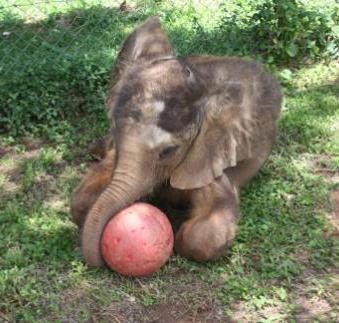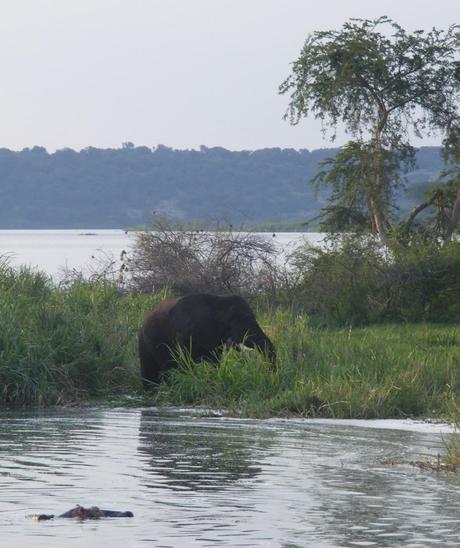Last week I had an elephant encounter at Uganda Wildlife Education Centre in Entebbe.

Baby elephant Charles loves to play football! Here he is at five months old
When you first encounter this baby elephant Charlie, thoughts of murder are far from your mind.
Originally from Queen Elizabeth National Park, Charles was brought to UWEC (a.k.a. the zoo) at the tender age of three weeks old, a victim of poachers that tragically saw him orphaned and then abandoned.
Fishermen of Hamukungu fishing village found baby Charles abandoned on the shores of an island on Lake George, trying to swim. Since there were no other elephants nearby, and the baby was about to drown, the rescuers loaded Charles into their wooden dugout canoe and paddled him back to Hamukungu.
Can you imagine – seeing a baby elephant being paddled across the lake!
The fishermen were compensated for their quick-thinking by the Uganda Wildlife Authority (UWA) and fisherman Charles was delighted for the elephant to be named after him!
Two days after the dramatic marine rescue, the carcass of an adult male elephant with six bullet wounds to the head and thoracic regions (indicative of poachers) was found submerged, next to the same island. It’s suspected that ivory poachers may have scared the elephant family away, leaving behind the newborn baby.
On arrival at UWEC a week later, baby Charles was weak, exhausted, and extremely thirsty. He was believed to be about a week old, as the umbilical cord was still attached. He did not know how to suckle; neither did he know the taste of milk.

Bull elephant feeding along the Kazinga Channel. Can you spot the hippo?
Organisations like the Uganda Conservation Foundation are working hard with UWA to stop poaching, remind local people of the penalties for poaching and the benefits of community conservation. UCF is building the capacity of UWA to work on the waterways of Queen Elizabeth by providing boats, professional marine ranger training and ranger accommodation posts. Uganda’s National Parks were once teeming with wildlife but the politically unstable years of the 1970s and 80s killed off all the rhino and Queen Elizabeth’s elephant population dropped by approximately 80%. The population has been slowly recovering but tragically, the international trade in ivory is undergoing an unprecedented increase. At least 13 Ugandan elephants were killed for ivory in 2011 and they desperately need more protection.

